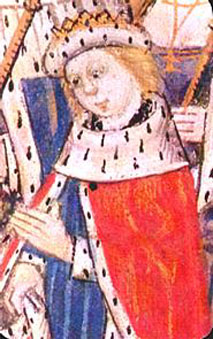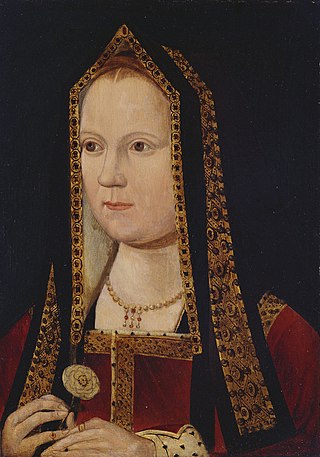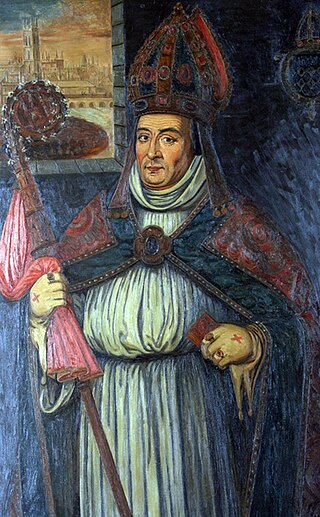Related Research Articles

Edward V was King of England from 9 April to 25 June 1483. He succeeded his father, Edward IV, upon the latter's death. Edward V was never crowned, and his brief reign was dominated by the influence of his uncle and Lord Protector, the Duke of Gloucester, who deposed him to reign as King Richard III; this was confirmed by the Titulus Regius, an Act of Parliament which denounced any further claims through Edward IV's heirs by delegitimising Edward V and all of his siblings. This was later repealed by Henry VII, who wished to legitimise his reign by marrying Elizabeth of York, Edward V's eldest sister.

Henry VI was King of England from 1422 to 1461 and again from 1470 to 1471, and disputed King of France from 1422 to 1453. The only child of Henry V, he succeeded to the English throne upon his father's death at the age of eight months; he succeeded to the French throne on the death of his maternal grandfather, Charles VI, shortly afterwards.

Elizabeth of York was Queen of England from her marriage to King Henry VII on 18 January 1486 until her death in 1503. She was the daughter of King Edward IV and his wife, Elizabeth Woodville, and her marriage to Henry VII followed his victory at the Battle of Bosworth Field, which marked the end of the civil war known as the Wars of the Roses.

The Princes in the Tower refers to the mystery of the fate of the deposed King Edward V of England and his younger brother Prince Richard of Shrewsbury, Duke of York, heirs to the throne of King Edward IV of England. The brothers were the only sons of the king by his queen, Elizabeth Woodville, living at the time of their father's death in 1483. Aged 12 and 9 years old, respectively, they were lodged in the Tower of London by their paternal uncle and England's regent, Richard, Duke of Gloucester, in preparation for Edward V's forthcoming coronation. Before the young king's coronation, however, he and his brother were declared illegitimate by Parliament. Gloucester ascended the throne as Richard III.

Henry Stafford, 2nd Duke of Buckingham was an English nobleman known as the namesake of Buckingham's rebellion, a failed but significant collection of uprisings in England and parts of Wales against Richard III of England in October 1483. He was executed without trial for his role in the uprisings. Stafford is also one of the primary suspects in the disappearance of Richard's nephews, the Princes in the Tower.

Oriel College is a constituent college of the University of Oxford in Oxford, England. Located in Oriel Square, the college has the distinction of being the oldest royal foundation in Oxford. In recognition of this royal connection, the college has also been historically known as King's College and King's Hall. The reigning monarch of the United Kingdom is the official visitor of the college.

Thomas Linacre or Lynaker was an English humanist scholar, Catholic priest, and physician, after whom Linacre College, Oxford, and Linacre House, a boys' boarding house at The King's School, Canterbury, were named.

Sir John Cheke was an English classical scholar and statesman. One of the foremost teachers of his age, and the first Regius Professor of Greek at the University of Cambridge, he played a great part in the revival of Greek learning in England. He was tutor to Prince Edward, the future King Edward VI, and also sometimes to Princess Elizabeth. Of strongly Reformist sympathy in religious affairs, his public career as provost of King's College, Cambridge, Member of Parliament and briefly as Secretary of State during King Edward's reign was brought to a close by the accession of Queen Mary in 1553. He went into voluntary exile abroad, at first under royal licence. He was captured and imprisoned in 1556, and recanted his faith to avoid death by burning. He died not long afterward, reportedly regretting his decision.

Richard of Shrewsbury, Duke of York was the second son of King Edward IV of England and Elizabeth Woodville. Richard and his older brother, who briefly reigned as King Edward V of England, mysteriously disappeared shortly after their uncle Richard III became king in 1483.

William Waynflete, born William Patten, was Headmaster of Winchester College (1429–1441), Provost of Eton College (1442–1447), Bishop of Winchester (1447–1486) and Lord Chancellor of England (1456–1460). He founded Magdalen College, Oxford, and three subsidiary schools, namely Magdalen College School in Oxford, Magdalen College School, Brackley in Northamptonshire and Wainfleet All Saints in Lincolnshire.

Richard William Jelf was the fourth Principal of King's College, London.
Daniel Coxe III was an English physician and governor of West Jersey from 1687 to 1688 and 1689 to 1692.

William Bill was an English priest and academic who was Master of St John's College, Cambridge (1547–1551?), Vice-Chancellor of the University of Cambridge (1548) and twice Master of Trinity College, Cambridge, Provost of Eton College (1558–1561) and Dean of Westminster (1560–1561).
Events from the 1480s in England. This decade marks the beginning of the Tudor period.
Events from the 1490s in England.
Events from the 1500s in England.
John Fryer was an English physician, humanist and early reformer. He was a Member of the Parliament of England for Portsmouth in 1545.
Thomas Moundeford M.D. (1550–1630) was an English academic and physician, President of the London College of Physicians for three periods.

Richard Warren (1731–1797) was an English physician and society doctor.
Thomas Thackeray was a Church of England clergyman who taught at his old school, Eton College, and ended his career as Head Master of Harrow School. He received the degree of Doctor of Divinity (DD).
References
- ↑ "Argentine, John (ARGN457J)". A Cambridge Alumni Database. University of Cambridge.
- ↑ Rhodes, D.E. (April 1962). "The Princes in the Tower and Their Doctor". The English Historical Review. 77 (303). Oxford University Press: 304–306. doi:10.1093/ehr/lxxvii.ccciii.304.
- 1 2 Klaassen, Frank (2013). The Transformations of Magic: Illicit Learned Magic in the Later Middle Ages and Renaissance. Penn State University Press. p. 227. ISBN 9780271056265.
- ↑ Rhodes, D.E. (1956). "Provost Argentine of King's and his Books". Transactions of the Cambridge Bibliographical Society. 2 (3). Cambridge Bibliographical Society: 205–209.